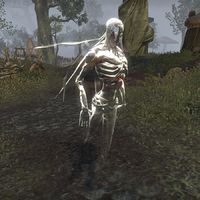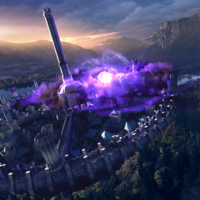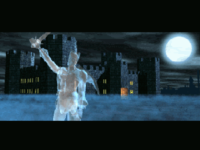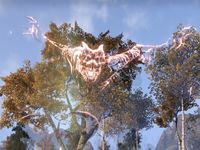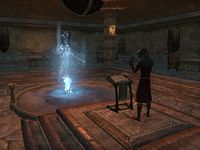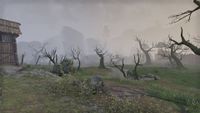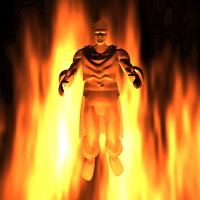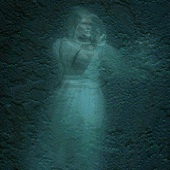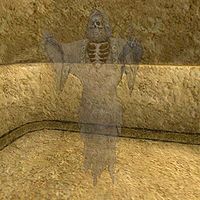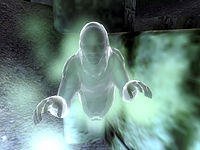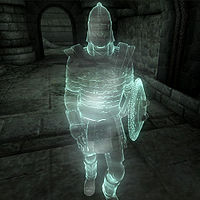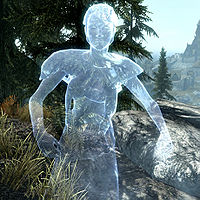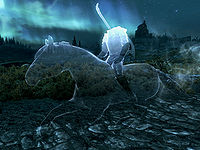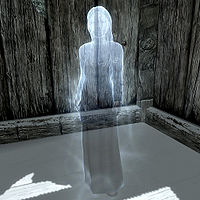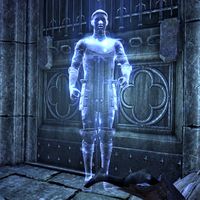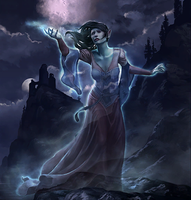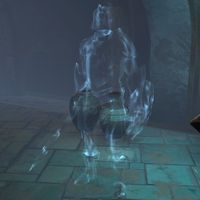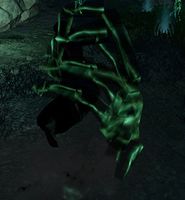Lore:Ghost
Ghosts, are the disembodied souls of the deceased that for one reason or another are unable to move on to their respective afterlife. They are classified as being a form of undead known as the Returned. Most often, they remain on Nirn because they had some form of unfinished business they wanted to see completed before they moved on.[1] But they could also come about when prevented from entering the afterlife. One of the known methods of this is through the use of curses, magical rituals can also be performed to summon and bind them to Nirn. One of the most prolific methods of bringing back souls as ghosts is through the use of necromancy.[2]
Ghosts come in many shapes and forms—some are so degraded they appear to only have their upper bodies, while others may appear skeletal, or whatever shape their body was in death. Most often, they will appear exactly how they did in life.[3] During combat, ghosts can see invisible enemies and often have a chilling effect on those they attack, being also able to drain the magicka of their enemies from a distance. They can even be hard to hit, often hiding in the shadows where they are effectively invisible.[4]
Similar to other supernatural creatures, ghosts are often the target of professional hunters dedicated in dealing with them, with some of those hunters encountering various strange spirits and unusual entities during their hunts.[5][6][7]
Contents
History[edit]
First Era[edit]
Before the rise of Reman Cyrodiil as emperor of the Second Empire, legends state that Cyrodiil bled with ghosts thanks to the chaos of the period when the Imperial Province lacked an emperor or the Alessian Empire.[8]
Second Era[edit]
At some point, the Daedric Prince Molag Bal made a pact with a priest of Stendarr that caused a curse to befall the Breton village of Westtry, causing the inhabitants of the entire village to become ghosts and relive their invasion in the hands of Nords over and over again as.[9] The curse of the town was later broken thanks to the aid of the Vestige, using a magical gem in order to free the spirits of the townspeople, allowing the people of the village to finally find some rest.[10]
The Planemeld[edit]
In 2E 578 or 2E 579 the infamous necromancer Mannimarco, convinced the Cyrodilic Emperor Varen Aquilarios that, despite not being Dragonborn, if they slightly modified the coronation ritual, they would be able to both relight the Dragonfires and convince Akatosh to gift Varen with the blood of a dragon.[11] However, Mannimarco corrupted the Amulet of Kings, and, by performing the ritual, Varen broke the divine covenant of Akatosh and Alessia which protected Nirn from the forces of Oblivion. This caused what was known as the Soulburst, which not only tore the veil between Mundus and Oblivion but also tore the veil between Aetherius and Nirn. This tearing increased the number of hauntings to record levels, even average mortals were able to visibly and audibly hear ghosts, and wraiths they normally would have never been able to see or hear. The tearing in the veil also allowed necromancers to raise many forms of undead on an unprecedented scale. Its unclear if staving off the Planemeld allowed for these restless spirits to return to Aetherius.[12][13]
In 2E 582 an army of Chimer spirits led by General Radrathren, returned to haunt the ancient battlefield of the Starved Plain, near the city of Davon's Watch in Stonefalls. The ghostly army was not only just a threat to invading Daggerfall Covenant soldiers, who were invading Daven's Watch at the time but also a threat to the Ebonheart Pact armies repelling the Daggerfall Covenant army. The Vestige was tasked with finding a solution to the threat. One mage suggested enslaving the ghosts to fight for the Pact, and help defend against the Covenant, while the other mage suggested the ghosts should be set free and returned back to their natural rest. It is unknown if the Vestige decided to free the army or instead took the suggestion of enslaving the army to help defend Davon's Watch.[14]
During the same year, the Bloodthorn Cult violated the tomb of Warcaller Targoth and his warriors in Betnikh, dragging their spirits back into the mortal realm as ghosts, with the commander of the cult using the magical war horn of Targoth in order to attract he and his warriors.[15] The ghost of Targoth then asked the Vestige for help, with the hero later freeing the warcaller, although it is unclear if they freed his warriors as well by returning the magical horn or if they remained as spirits if the horn was kept.[16] If the horn was kept, the army of ghosts would have been present during an attack against the Bloodthorn Cult by the local orcs of Betony of the Seamount Clan, giving their living kin a valuable reinforcement during the battle, with Targoth himself recognizing the reason to keep the horn as he and his warriors were able to help their living kin even in a ghostly form.[17]
The same Bloodthorn Cult would later attack a burial mound in the Glenumbra region of High Rock, where they similarly began to enslave the spirits of the dead to do their biding. Once again the Vestige interfered, killing the cultists who were attempting to bind the ghosts and also defeating the spirit of one of the great heroes who had been successfully enslaved, freeing the ghosts in the process.[18]
Meanwhile in Stormhaven, a group of ghosts of bandits began to threaten the surrounding area of the cave where they had been originally starved to death, with many spectral archers, brigands and rogues at their side.[19] The Vestige later aided the ghost of the knight that attempted to kill the bandits in life, defeating the spirits of the criminals and trapping them inside the sword of the knight, fulfilling the vow of the soldier and allowing him to rest as well as ending a threat to the region.[20]
Third Era[edit]
In 3E 253, the Camoran Usurper sent the Nightmare Host to take control of the Barony of Dwynnen.[21] According to legend, it comprised of a lich ruler and its army of undead, including ghosts. These monsters were defeated by Othrok and his holy army of men and animals. Othrok went on to become the first Baron of Dwynnen[22] and his army later became the modern-day Order of the Raven.[23]
Imperial Simulacrum and Warp in the West[edit]
King Lysandus and his legions of ghosts haunted the streets of the city of Daggerfall at night circa 3E 405, calling for "vengeance". It was even recommended that people should not wander the streets of the city at night as any travelers would be certainly attacked.[24][25]
The hauntings would only end thanks to an Agent of the Blades who interfered, with the hero being able to soothe the rage of the ghost after sprinkling a special dust onto Lysandus' corpse, allowing the two to communicate. Lysandus informed the hero about his wish for vengeance against Lord Woodborne of Wayrest.[26] With the death of Woodborne and Lysandus vengeance complete, the spirit of the king was able to return to the afterlife alongside his legions of ghosts, leaving Daggerfall safe.[27]
Other hauntings often happened in houses in the Iliac Bay done by ghosts that said that they built the houses that were haunted, with temples of the Divines often asking adventurers to deal with the issue in return for appreciation of the temple that contracted the adventurer in question.[28] Similar quests were also offered to the members of those temples as well.[29] Members of the Benevolence of Mara were also sometimes asked to deal with a haunting that happened in their sacred shrines in the region and if the member failed, Maran Knights would be sent instead, causing the ghost in question to rest in peace regardless.[30]
Similarly, Knightly Orders of the Iliac Bay often had to deal with exorcisms of ghosts as well, as the spirits often haunted abandoned properties that nobles resided, with the nobles in question contracting the Orders for the job. If the job was refused by a knight, the Order might have turned the job to the temples of the Divines instead.[31]
Sightings in 3E 427[edit]
By the time of the appearance of the Nerevarine in 3E 427, many ghosts were found across Vvardenfell and in the underground ruins of Mournhold, particularly in the ancestral tombs spread across the island.[32] Some ghosts of the Dwemer were also found haunting the ruins of their cities at the time, both in Vvardenfell but also in the underground portions of Mournhold.[33][34][35]
One ghost was even seen in a section of Vivec City[36] while another haunted an inn in the Telvanni city of Sadrith Mora, ruining the local business of the establishment and scaring customers, with this special ghost being able to be killed again but always returning. Investigations eventually pointed out that a conjuration expert was to blame, with the conjurer saying they were using the haunting as a joke.[37] Members of the Imperial Cult of Vvardenfell sometimes had to deal with similar hauntings that caused problems, such as one that happened beneath a house that was built on top of a Dunmer ancestral tomb.[38]
Oblivion Crisis[edit]
Later, many ghosts were found across the Imperial Province of Cyrodiil by the time of the Oblivion Crisis, usually being found in Ayleid ruins, some caves or even in the undercrofts of chapels.[39] Notable occurrences of ghosts during this period happened after an entire family was murdered by a member of the Dark Brotherhood, causing the matriarch to attempt to attack the assassin in a ghostly form and another happened in Anvil where a manor was being haunted and the curse on the location had to be lifted by the one who bought it.[40][41]
There was a ghost that haunted the Niben Bay that people have dubbed the "Forlorn Watchman". He would always appear at 8pm and sadly overlook the water from the ruins of Fort Irony. The people claimed that the ghost died in a horrible shipwreck but the truth had eventually come out.[42] The ghost was originally the sailor, Grantham Blakeley, who was thrown overboard during a mutiny in 3E 421.[43] An adventurer caught wind of the legend and tracked down the ghost in his usual haunt. Blakeley pointed them to the shipwreck on the Mouth of the Panther and released his soul from the mortal world by destroying his killer, the mutineer and gloom wraith, Gable the Traitor.[42]
By this time, several ghosts of members of the Blades were found in the ruins of Sancre Tor after being freed from a curse that kept them as undead by the Hero of Kvatch.[44] Another haunting event was seen in a ship of Anvil known as The Serpent's Wake, with the ghosts of the crew remaining after being murdered, with the Hero of Kvatch being asked to retrieve a crystal ball found inside the ship, likely causing the hero to attack the spirits in the process.[45] The Hero would later put an end to the curse Sheogorath placed upon the ghosts inhabiting Vitharn, a curse that for many years forced them to relive the events of their defeat at the hand of Vassal Fanatics. When the curse was lifted the spirits were finally able to move on to their rest.[46]
Fourth Era[edit]
By the year 4E 201, several cases of ghosts and hauntings were seen in the region of Skyrim, with them being seen in ruins, the wilds and sometimes even in populated areas.[47] A notable case of ghosts happened after a necromancer amassed a legion of enslaved ghostly followers who were eventually asked by the necromancer to gather other people in order for their numbers to be further expanded, allowing for a potential threat to Skyrim as this army was built up.[48]
Several ghostly visions of members of the College of Winterhold were also seen by this time by a member of the College while the person was delving in the Nordic ruin of Labyrinthian, with most of the ghosts appearing to relive their final moments. Two of the spectres were holding the Dragon Priest Morokei with magic, having remained in that state thanks to the actions of Savos Aren.[49]
Ghosts of members of the Dark Brotherhood defended their sanctuary in the city of Dawnstar and might have been encountered by a member of the organization of assassins while pursuing a traitor.[50]
Ghosts of Animals[edit]
Ghosts of animals are sometimes used as mounts both by other ghosts and the living, such as is the case for horses returned from the grave.[51] Other animals, such as cats, can also appear as ghosts, with Nibenese legends stating that a cat can haunt the house where its owner was murdered, with the cat being sent by Lord Hollowjack to torment the killer with shame and guilt.[52] One of the favored feline companions of Telvanni wizards is a type of cat from the city of Necrom said to be capable of seeing spirits.[53] Other cats are also said to have the same ability and can even keep company to ghosts that are haunting houses.[54]
Ghosts of chickens sometimes have mystery behind their existence, with it being suggested that they might appear after killing those animals in places that are already haunted.[55]
According to the Augur of the Obscure, the ghosts left behind by coral are horrifying to behold.[56]
Characteristics[edit]
As the disembodied souls of the dead, ghosts are normally insubstantial and incorporeal,[57][58] able to neither be touched nor be seen.[59][60][61] Manifesting in a tangible and visible form requires energy, which not all ghosts have, as a result, though present throughout Tamriel, a spirit will often not appear until it comes into contact with necromantic energy.[62] Spirits can accumulate magicka over time.[63]
Ghosts are innately audible and visible to certain mortals with unnaturally keen perception, as well as during phenomena such as the Planemeld which both increase the frequency of hauntings and allow even the average mortal to perceive spirits,[12][61][64] surviving a near-death experience is also said to make communication with spirits easier.[65] Places where a lot of suffering has occurred are said to be infused with the necromantic energies a soul feeling such emotions produces, this miasma can form a trap which prevents souls from moving on to the afterlife and turns them into ghosts, a phenomenon commonly encountered in battlefields.[66]
In addition to manifesting in a spectral form, a ghost can make its presence known through other means such as influencing its environment through speaking or moving objects,[67][68] possessing the living,[69][70][71][72] possessing and reanimating the dead,[73] or possessing and animating one or more inanimate objects such as statues or Dwemer Animunculi.[74][75] In some cases a ghost might attach itself to a living host and remain with them over a period of time, seeking to enjoy a pale likeness of the life they lived, pursue sensations they craved in life, or take their host's life for themselves. Such spirits fall into three categories, Lurking-type Spirits who wait in lonely places for a host and settle in the recesses of their mind undetected, Possession-type spirits who seek to avoid detection so they can infiltrate their host's mind and gradually consume their thoughts until they've no identity left, and Traveler-type spirits who attach themselves to those who seek sensations like adventure but might influence their host towards recklessness and consequently death. The presence of such spirits can be sensed by ghost hunters as a form of spiritual malaise, allowing for the use of cleansing rituals to banish the intruding presence.[6]
As they no longer have bodies, ghosts do not normally feel sensations like pain or exhaustion, and will eventually start to forget them, they also require no sleep or sustenance. Exceptions to this lack of sensation exist in the form of necromancy, as necromantic bindings or having part of their bodies bound to a flesh construct is described as painful for the spirit, and of things which the ghost is vulnerable to in combat, which can also inflict pain.[76][77][78][79] If a ghost has part of its body incorporated into an undead construct such as a Flesh Atronach, the spirit will be able to feel both the construct's drive to kill and feed, and any physical blows the construct might receive, though the ghost itself can also use the connection to influence the construct to perform certain actions. The spirits that have body parts bound to the same undead construct can sense one another.[78][80]
Because ghosts are already dead "slaying" a ghost won't always end the haunting,in such cases the spirit is said to only sleep for a time until it awakens and returns once more,[81] though methods like trapping the spirit in an enchanted object and than destroying the item can prevent its return,[19], tethering the spirit to its body through magic can imprison it,[82] and certain rites such as those employed by the Keepers of the Dead can also usher a ghost's passage into the afterlife.[67] Even when its soul was sundered by powerful magic, it is said a ghost can eventually recoalesce in the same location, given enough time. Indeed, the fragments of a spirit shattered by magic need to be bound by spells to prevent them from seeking each other out and reforming into the whole, and will proceed to recoalesce once the spell keeping them apart is lifted.[83]. Magic can be used to bind a spirit from moving on to the afterlife, but it is said even such souls can find a way to move on eventually.[84][85] There are certain tones of sound which are painful to immortal creatures, including ghosts and vampires, spirit hunters have been known to use special whistles which emit this tone to repel such beings.[7]
The more recent the death, the stronger the lingering connection a spirit has to its original body and the harder it will be to control that body via necromancy,[86], because of this link spirits instinctively know which bones are their own.[80]Some ghosts have also been shown to retain a connection to their descendants, communicating with them through dreams and transmitted feelings in order to drive them to finish what unresolved affairs are keeping them in the mortal world and lay their spirits to rest, and guiding them with illusory projections of the events of their lives along the way.[87] The spirits of the dead, even those that have otherwise been long dormant and inactive, can be roused when given a taste of the vitality of the living. Once given a taste of the life they now lack these roused spirits become thirsty for more and cannot return to slumber, thus the spilling of blood near places where the dead rest is a method used by necromancers who wish to awaken them for their purposes. Both blood taken from an unwilling target and blood given willingly can call to the dead, but it is ill advised for a necromancer to offer their own blood for this process. The dead hunger for more of the vitality of the one whose blood they were given, and so them developing a taste for the necromancer's own lifeforce can prove highly dangerous.[88]
A ghost's form is dressed in the same clothes it last wore in life,[77] spirits will also sometimes manifest alongside replicas of objects they were associated with while living, one captain was even known to still command a spectral version of her ship in death.[89]
A ghost which becomes consumed by its negative emotions will transform into a Wraith.[62][90] Some ghosts can also take on the form of Wispmothers.[91] Many reports from across Tamriel describe a phenomenon where the souls of the dead adopt a variety of forms to return and speak with the living. Animals, plants, or even fearsome visions, are all reported manifestations. It has been theorized that the Luminaries, immortal entities of pure magic, might also be such beings, Ascended Ancestors returned in a different form.[92]
It is sometimes possible for someone to manifest as a ghost while they are soul trapped and their spirit's container is held elsewhere.[93][94] The soul of an individual on the precipice of death can manifest in a spectral form, similar to a ghost. A soul burdened by strong emotions such as regret can splinter, its parts manifesting simultaneously in multiple locations tied to those emotions.[95] Such souls, caught between life and death, can be prevented from moving on to the afterlife through the use of powerful magic. However, even the power of a Luminary can't prevent a soul from passing on to Aetherius indefinitely, and powerful wraiths might eventually arrive to force the transition into Aetherius.[96][97]
During certain times such as the Tsaesci Proving Festival, the living have the ability to communicate with the spirits of the dead by invoking their names, while the dead have the ability to gaze upon the living world and cross over to pass judgement on their descendants or those who've invoked them should they so desire.[98][99]A similar phenomenon occurs during the Old Life Festival, a holiday celebrated throughout the Empire when the living reach out to the departed by leaving messages at shrines, and the departed sometimes return from Aetherius in response.[100]
Demeanor[edit]
Spirits are said to not like to visit the mortal world, with it being claimed they do so only out of duty and obligation. Some spirits claim that their otherworld is more pleasant, or at least more comfortable for spirits than the mortal realm, which is cold, bitter, and full of pain and loss. As such, spirits that are forced to remain in the mortal plane, whether by their own unfinished business or by external magic, often go mad.[101]
Some ghosts are shown to still heed the allegiances or cultural traditions they held to in life, with a captain's crew or the army of a general or king returning collectively when called,[89][27][102] and even being conjured directly to the side of the spirit they've allegiance to.[103][104][105] This phenomenon can even be encountered with spirits already in the afterlife.[106]
Some Ayleid ghosts are said to mark the living who've somehow managed to gain their favor, making glowing marks resembling the Blessed Life-Tree appear on their bodies that can potentially also gain favor from any other ghosts lingering in Ayleid ruins.[107]
Powers[edit]
The nature of ghosts gives many of them special capabilities when it comes to their manifestations, with some of them being able to fly and use the shadows to turn invisible.[4] Other ghosts have spells that are capable of dealing considerable damage at a short range and are only able to be damaged by weapons made out of silver or better materials, therefore being completely invulnerable to unprepared adventurers.[108]
Ancestor ghosts seen in the region of Morrowind were also immune to weapons made out of normal materials, with some of them being able to cast curses on their enemies, reducing various capabilities while also causing damage.[109] At least one of the ghosts in Vvardenfell was even able to give the disease of Brown Rot to the ones that they attacked.[110]
Various ghosts can also use frost spells natural to them in order to combat their enemies, with some of those ghosts even being immune to effects of silence, causing them to be dangerous and problematic even to prepared mages. Some of the ghosts with those capabilities of attack and defense have been seen to not be affected by normal weapons, but are able to be hit if the weapon in question is enchanted.[111]
While many ghosts have special offensive abilities such as conjuring spectral apparitions, reanimating the dead,[73], or opening portals,[98] there are also those that merely retain and use what they had in life, such as archers that can use their own bow and arrows, even if in spectral form, as a way of offense against their enemies. They are still capable of disappearing without leaving a trace behind if they need to move somewhere else though, showing access to supernatural powers.[112] Other ghosts can be seen wearing a variety of weapons other than bows such as swords and battleaxes, sometimes using a shield for defensive purposes,[113] or a stave for the use of magic.[114]
The powers of the ghosts are not limited to only combat, they can also be valuable with information, exhibiting perception of things which occur in remote locations or within the confines of the area their haunting is tied to,[77][115], being able to sense curses, whether someone has a soul, or when a life expires,[19][116][115] and sometimes holding knowledge that mortals are not aware of and that can be precious even to a god, therefore being able to help with advice in various ways.[117] It is said they can "know and affect the future, speak with other spirits and work great magic", and they can allow for the living to communicate with other ghosts.[118][119] In addition the abilities of spirits can sometimes be of use with providing protection through the lifting of curses,[120] or through granting blessings that shield from dangerous magic.[121] Ghosts can also perform various duties even in their spectral form, although sometimes they might not be aware that the area that they are acting for is not abandoned, with the god Auri-El being known as capable of having his followers in such a state.[122] Ghosts are also one of the many creatures that are capable of escaping physical barriers naturally, forcing mages to create spells with a high cost of magicka in order to contain them, although objects like binding stones can also be used.[123]
Some ghosts are also capable of opening portals to their last moments of life, allowing the one that steps through the portal to see a vision of what happened, with the vision being able to show events as they happened even in the eyes of the enemies of the ghost that opened the portal.[124]Others simply project illusory recreations of moments from their lives.[87]
There exist dangerous ghosts that will steal the souls of the living,[19] or even enthrall those whose souls they take to their service causing them to return as ghosts as well. Among such hostile spirits those who expel living souls to steal their bodies are known as Body Shifters and are considered very dangerous.[125][126][72]
Certain spirits are shown to be able to travel to other planes, manifesting there to take vengeance on those who've wronged them,[127] or returning to the living world from the afterlife to bestow blessings to those who've aided them and departing again,[128] while others can create magical barriers,[129], dispel them,[130], or provide fortifying blessings.[131]
The spirits of certain mages who created a spell or curse in life have been shown to be able to continue powering and maintaining their creations even in death, with their spirits needing to be vanquished and bound for the curse to be lifted.[132] A spirit's essence can be given fully in order to cast especially powerful magic, sacrificing the spirit's independent spectral existence in the process. Such an event occured when the spirit of the mage Alanwe sacrificed herself to banish the fully powered Ebony Blade from Tamriel for a long time and cursed it to never stay with any one wielder for long, despite the will of its creator Mephala and the Blade's magic attempting to resist.[83]
Cultural Significance[edit]
Dunmer[edit]
According to Dunmer ancestor worship, the spirits of the dead continue to exist in the world, being able to "know and affect the future, speak with other spirits and work great magic". The Dunmer believe that recently deceased spirits are weaker but close to the living in spirit, quick to guide and protect, whereas older spirits are stronger but stranger and more distant, with the Daedra being the oldest and greatest but also strangest of such spirits. Malevolent spirits are considered "daemons and "devils" from whom benevolent " Hero" spirits protect.[118]
For the Dunmer, the proximity with the ghosts of the deceased is one much closer if compared to other races, with the ghosts being generally able to be interacted and honored. Ghosts can even be found defending the hearth, teaching wisdom to future generations and allowing some to know better about the future, in return they are guarded and protected by the Dunmer, who keep a close proximity with them.[133]
The bond between a Dunmer and the ghostly ancestors is partially blood, ritual and volitional, with a member being brought into a House thanks to marriage being able to bind themselves through ritual to another House and therefore gain access to communicate and benefit from the ancestors of another family. That bond of marriage is weaker than the one of their offspring, and they still maintain access to their own ancestors who can be contacted and worshipped in a family shrine.[101]
This relationship with the ancestors and their ghosts is extremely intimate and personal, but also quite serious. Dunmer also feel that all that they think and do is under the watchful eye of the ancestor spirits, causing a special interaction with those ghosts.[134] Ancestor worship is also practiced by the Ashlander tribes and was not exclusive to the Tribunal Temple Dunmer when the Tribunal were an active force as gods.[135]
Due to those beliefs, both the Tribes and the Temple believed that forcefully summoning the ghosts of the ancestors was a shameful and sinful act as it not only made them slaves but also took the spirits out of their own world. The Dunmer did often consider it cruel to take the spirits even if it was done out of their own will in service and love to family and their race, but it was seen as much worse if it was forceful necromancy, with the action not being tolerated in Morrowind in general.[136]
Bretons[edit]
There are many legends and spooky stories in High Rock involving ghosts and their hauntings, with many ruined castles and other ruins that dot the countryside, with each likely having a story of ghosts behind it. The ruins of Baelborne Rock and Dresan Keep in particular had many legends surrounding them while other areas were completely suggested that they should be avoided both thanks to the hauntings and the danger that the undead posed.[137] Glenumbra as a whole is known for being haunted; it is said that everyone living there has some story to tell about a haunting. While the woods of Daenia are believed to be haunted, they are actually inhabited by spirits of nature. The most haunted area within Glenumbra is the Glenumbra Moors, the area where the Battle of Glenumbra Moors took place in the First Era. Another famous haunted location within Glenumbra is the cemetery of Cath Bedraud, where many of those who died at the Battle of Glenumbra Moors were buried. During times of heavy fog, ghostly lights and moans have been reported to be seen in the vicinity of the cemetery.[137]
Another area with many ghost stories is the Cambray Hills where Camlorn is located, as that part of High Rock is known for being haunted as well, with any given member of the populace being believed to know to usually have a unique ghost story or two.[138]
Bosmer[edit]
It was speculated that some talismans made by Bosmer were created and worn in order to ward off ghosts or to keep spirits from crawling back out of tar-pits where the Bosmer that disobeyed the Green Pact were buried, sometimes alive.[139]
Bosmer Spinners claim that the spirits of the dead experience a change upon reaching Aetherius, with many souls of mortals becoming spirits of a different sort in that place.[140]
Nord[edit]
An ancient Nordic tale, known as Yngol and the Sea-Ghosts refers to the death of Ysgramor's eldest son, Yngol, at the hands of vengeful "Sea-Ghosts".[141] An odd custom observed in Solitude in the Second Era, involves placing a bowl of sea water inside the doorway to a house. This is believed to capture any wandering spirits that may come from the Sea of Ghosts.[142]
Reachmen[edit]
Some clans of Reachmen are believed to worship the ghosts of the dead, often sacrificing goats to ancient heroes.[143] Some ghosts of the Reachfolk remain on Nirn to provide guidance to their descendants. One of such ghosts was the legendary Vateshran Aydolan.[144]
Psijic Order[edit]
The Psijic Order maintains that souls that cross over into the afterlife can grow to gain great power and rule there, with a particularly malevolent tyrant for example, feeding into the power of Daedra like Boethiah and Vaermina through their acts in life, and going on to "rule in Oblivion" after death. The Psijics believe that the "Daedra and gods to whom the common people turn" are themselves "no more than the spirits of superior men and women whose power and passion granted them great influence in the afterworld" and that while living they too were "bewildered" by their own ancestors going back to the original progenitors, the Acharyai.[145]
Other Beliefs[edit]
Many reports from across Tamriel describe a phenomenon where the souls of the dead adopt a variety of forms to return and speak with the living. Animals, plants, or even fearsome visions, are all reported manifestations. It is theorized that the Luminaries, immortal beings of pure magic, might have originated as mortal souls, being the spirits of Ascended Ancestors that transformed into their current state after death due to this described phenomenon. As the Luminaries themselves can't recall their origins, this theory remains unproven.[92][146] Whatever the case, however, a Luminary can indeed be created out of the essence of a mortal soul, as was the case with the Crow Luminary, who was created through a ritual devised by Ulfsild the Evergreen out of a portion of her own essence. Though the process is straining and the restoration of the spirit takes time, a soul that was used in such a manner will eventually recover.[147]
Gallery[edit]
Notes[edit]
- Sometimes necromancers are suggested to use their servants sparingly and to allow no one to see them in order to cause others to eventually forget the undead. This was one of the practices done to combat Arkay and his influence, as the blessings of such a divine prevents those buried with proper rituals from being raised, which could likely affect the presence of ghosts as well.[148]
- Despite being somewhat common across Tamriel, there are those that show that they do not believe in ghosts.[149]
- Superstitious sailors are known to tell ghost stories, which include the presence of entire ghost ships as well.[150]
- Certain Daedra and Nature Spirits have been known to manifest in ghostly forms, however these creatures can never truly die, so these aren't truly ghosts.
See Also[edit]
- For game-specific information, see the Arena, Daggerfall, Battlespire, Shadowkey, Oblivion, Oblivion Mobile, Skyrim, Elder Scrolls Online, Legends
 , and Blades articles.
, and Blades articles.
References[edit]
- ^ Lord of Souls — Greg Keyes
- ^ Unhallowed Legions — Phrastus of Elinhir
- ^ Distinctions of Appearance, throughout the TES Games.
- ^ a b Arena Ghost description
- ^ Twilight Cantors: The Exorcists of Azurah — Theyo Prevette
- ^ a b Spirit Hunter Mayrineh's dialogue and encounter in ESO
- ^ a b Claudina Ildene's dialogue in ESO
- ^ Remanada
- ^ Events of The Ghosts of Westtry in ESO
- ^ Events of Memento Morri in ESO
- ^ Chronicles of the Five Companions
- ^ a b Gabrielle Benele Answers Your Questions
- ^ Introduction to the Lore of The Elder Scrolls Online
- ^ Events of Through the Aftermath in ESO
- ^ Warcaller Targoth's dialogue in ESO
- ^ Events of Tormented Souls in ESO
- ^ Events of Carzog's Demise in ESO
- ^ Events of Servants of Ancient Kings in ESO
- ^ a b c d Sir Edain's Spirit's dialogue in ESO
- ^ Events of Legacy of the Three in ESO
- ^ The Third Era Timeline — Jaspus Ignateous
- ^ The Fall of the Usurper — Palaux Illthre
- ^ Order of the Raven faction description in Daggerfall
- ^ Curse of Daggerfall quest in Daggerfall
- ^ Instructions from the Empire quest in Daggerfall
- ^ Lysandus' Revelation quest in Daggerfall
- ^ a b Lysandus' Revenge quest in Daggerfall
- ^ The Spook quest in Daggerfall
- ^ The Haunted House quest in Daggerfall
- ^ A Powerful Spirit quest in Daggerfall
- ^ The Exorcism quest in Daggerfall
- ^ Events of Morrowind
- ^ Dwarven Spectre presence in Morrowind
- ^ Dahrk Mezalf presence in Morrowind
- ^ Radac Stungnthumz presence in Tribunal
- ^ Ancestor Guardian presence in Morrowind
- ^ Events of the Gateway Ghost in Morrowind
- ^ Events of The Haunting in Morrowind
- ^ Events of Oblivion
- ^ Presence of Perennia Draconis in Oblivion
- ^ Where Spirits Have Lease quest in Oblivion
- ^ a b The Forlorn Watchman quest in Oblivion
- ^ Log of the Emma May, 3E 421
- ^ Blood of the Divines quest in Oblivion
- ^ The Ghost Ship of Anvil quest in Oblivion
- ^ Events of Ghosts of Vitharn in Oblivion
- ^ Events of Skyrim
- ^ Arondil's Journal — Arondil
- ^ The Staff of Magnus quest in Skyrim
- ^ The Cure for Madness quest in Skyrim
- ^ True Ghost Horse mount description in ESO
- ^ Ghostly Housecat pet description in ESO
- ^ Necrom Ghostgazer Cat pet description in ESO
- ^ Haunted House Cat pet description in ESO
- ^ Spectral Chicken pet description in ESO
- ^ Augur of the Obscure's dialogue in ESO
- ^ Spirits of Skyrim — Isstille the Scholar
- ^ On Summoning Skeletons
- ^ Arondil's Journal
- ^ Richard Dusant's dialogue in ESO
- ^ a b Fillia's dialogue in ESO
- ^ a b Materials for Novice Necromancers — Girara the Undying
- ^ Faindor's dialogue in ESO
- ^ The Infernal City — Greg Keyes
- ^ Theyo Prevette's dialogue in ESO
- ^ The Great Stain
- ^ a b Shelreni Baro's spirit inESO
- ^ Mavos Siloreth's spirit in ESO
- ^ Janne Emarie's spirit in ESO
- ^ Galgalah's spirit in ESO
- ^ Uldor's spirit in ESO
- ^ a b Ghost's dialogue in Wilding Run in ESO
- ^ a b Ghoragham's encounter in ESO
- ^ Yokudan Spirits and Yokudan Warriors in ESO
- ^ Dwemer Spectres and Haunted Centurions in ESO
- ^ Cynric Ginise's dialogue in ESO
- ^ a b c Meln the Mouthless' dialogue in ESO
- ^ a b Mayor Gette's dialogue in ESO
- ^ Tower Ghost's dialogue in Blades
- ^ a b Jon Surille's dialogue in ESO
- ^ Lauriel's dialogue in ESO
- ^ a b Alanwe's dialogue in ESO
- ^ Anconath's dialogue in ESO
- ^ Sombren's dialogue in ESO
- ^ On Necromancy — V
- ^ a b Alwyn's dialogue during Prisoner of the Past in ESO
- ^ The Thirsty Dead — Necromancer Marilia Relarys
- ^ a b Captain Ambre Denile's encounter in ESO
- ^ Praxin Douare's appearance in ESO
- ^ Lost Maiden in ESO
- ^ a b Loremaster's Archive - Scribing — Votary Nahila
- ^ Lisondor's spirit in ESO
- ^ Gasteau Chamrond's spirit in ESO
- ^ Jahones Valain's soul fragments in ESO
- ^ The Netch'dialogue in ESO
- ^ Inevitable End in ESO
- ^ a b Proconsul Beloren-Kaie's appearance in ESO
- ^ The Proving Festival — Laije-Palak Rulician
- ^ Petronius Galenus' dialogue during Old Life Observance in ESO
- ^ a b Ancestors and the Dunmer
- ^ Indaenir's dialogue during the Right of Theft quest in ESO
- ^ Shade of the Founder's encounter in ESO
- ^ The Storm King's encounter in ESO
- ^ The Forest King's encounter in ESO
- ^ Fildgor's invocation of the Spirits of Sovngarde in ESO
- ^ Blessed Life-Tree Body Markings
- ^ Ghost abilities and weapon resistance in Daggerfall
- ^ Ancestor Ghost abilities and weapon resistance in Morrowind
- ^ Wraith of Sul-Senipul Brown Rot disease chance in Morrowind
- ^ Ghost abilities and immunities in Oblivion
- ^ Katria abilities in Skyrim: Dawnguard
- ^ Companion Ghost equipment in Skyrim
- ^ Spectral Icecaster and Spectral Battlemage's equipment in ESO
- ^ a b Queen Nurnhilde's dialogue in ESO
- ^ Ayleid Spirit (Carzog's Demise)'s dialogue in ESO
- ^ Events of Divine Conundrum in ESO
- ^ a b Generic Dialogue in Morrowind
- ^ Leramil's dialogue in ESO
- ^ Valdemar's dialogue during Blood of the Divines in Oblivion
- ^ Saint Veloth's dialogue during A Saint Asunder in ESO
- ^ Gelebor's dialogue in Skyrim: Dawnguard
- ^ The Binding Stone — the Office of the Canonreeve of Corrections
- ^ Events of Unearthing the Past in ESO
- ^ Farwen Temolire's dialogue in ESO
- ^ Ashu-awa's dialogue in ESO
- ^ Ancestor Spirit and Orcthane Berserker's appearance in Heart's Grief in ESO
- ^ Ulfgar the Unending's dialogue in Morrowind
- ^ Priory of the Nine (quest) events in Oblivion
- ^ Events of Tending the Flames) in Skyrim
- ^ Umaril the Unfeathered (quest) rewards in Oblivion
- ^ Keeper Vildras' dialogue and Mendicant Sulinor in ESO
- ^ The Doors of the Spirit
- ^ Reflections on Cult Worship — Cuseius Plecia
- ^ Progress of Truth — Dissident Priests
- ^ Blasphemous Revenants
- ^ a b Ghosts of Glenumbra — Jean Dutheil
- ^ Glenumbra's People — Aldous Brousseau
- ^ Protective Tar Warding Sigil antiquity codex entries in ESO: Greymoor
- ^ Girnalin's dialogue in ESO
- ^ Yngol and the Sea-Ghosts
- ^ Nelos Drurel's dialogue in ESO
- ^ Great Spirits of the Reach — Vashu gra-Morga, Chief Daedrotheologist at the University of Gwylim
- ^ Aydolan's dialogue in ESO
- ^ The Old Ways — Celarus the Loremaster
- ^ Ulfsild's Notes: The Origin of Luminaries — Ulfsild
- ^ The Crow's dialogue in ESO
- ^ Arkay the Enemy — KW
- ^ Ralion's Journal — Ralion
- ^ Letter to Captain Oghul — Dulzur
|
|||||||||||||||||
